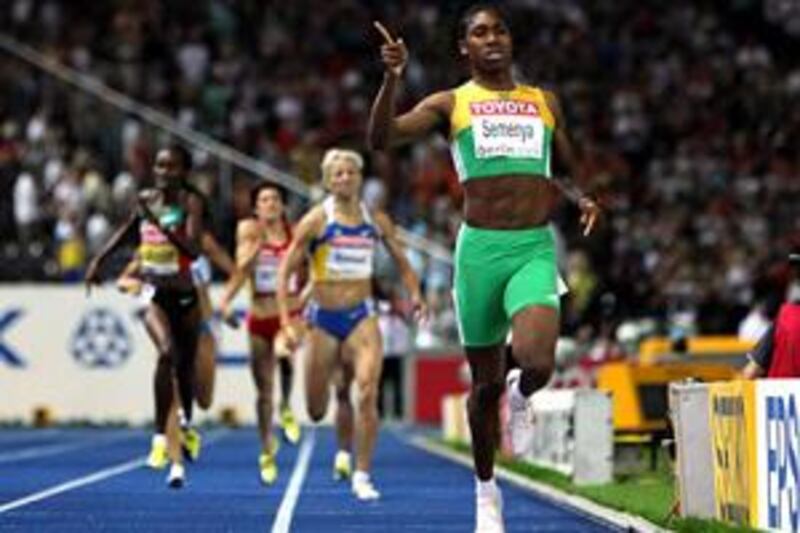It has hardly been sport's finest hour, moments in time in which the Corinthian spirit was damaged before shattering into tawdry little pieces. Embracing scenes that she was probably more accustomed to before her marriage to Nelson collapsed, the debatable Winnie Madikizela-Mandela is one of several political figures in South Africa who have attempted to turn the plight of the unfortunate Caster Semenya into something that it is not.
It has been a shameless form of opportunism more illuminating than Semenya's surge to the line in winning gold at the World Athletics Championships in Berlin. The International Association of Athletics Federations' failing has been in allowing the genetic testing of Semenya to become public knowledge after her winning run in the women's 800 metres. The race to exploit her situation has developed quicker than any time she has posted.
This remains a gender issue, not one of race. The truth has got lost somewhere in the ensuing melee, failing to stop Mandela, and various pressure groups pursuing their own agenda. The IAFF have botched the handling of the Semenya case, a point conceded by its president Lamine Diake, who is probably still wincing as an internal inquiry in the full glare of the public is carried out. Whatever the outcome of a gender test that will take weeks to complete, the outcry should ensure Semenya keeps her title. Unless she is guilty of doping, it would seem like the logical decision.
Allegations of sexism and racism and even reference to the days of apartheid have all been tabled. These are all bogus claims. This 18-year-old girl appears to have done nothing wrong other than win a major race. Her gold has been political gold to the African National Congress and assorted political groups, who ushered her off a plane at Johannesburg Airport like some sort of returning boxing champion.
This could take its toll mentally. The teenager's treatment at the hands of her compatriots has been as badly handled as the IAFF's investigation, but its decision cannot be faulted if the guidelines for testing are stipulated in its constitution. "There's a stereotype, a woman should put on make-up, high shoes and be soft, but she is a strong woman because women are strong," said Nehwoh Belinda of the rights group People Opposing Women Abuse.
In sport, women have another stereotype. Females have consistently been in touch with their masculine side. A woman athlete showing male traits is not new. Women have tried to gain an advantage over their female compatriots by becoming more manly, a point never lost on the old Eastern Bloc countries. The Polish athlete Stella Walsh won an Olympic sprinting gold in the 1930s, but was found to be male after she was shot dead in an armed robbery in 1980. Heidi Kreiger, one of many mechanical East Germans of the 1980s, binged on so many steroids that she became Europe's top shot putter in 1986 before turning into a man. She underwent a sex change operation. She now goes by the moniker of Harold.
To run faster, swim faster. throw longer or get more shots across the net, some women have had to be like men. If Semenya was competing in the men's final, where would she have finished? Cuba's Yeimer Lopez finished last in the final of the men's 800m with a time of 1.47.80secs. Semenya won her race in 1:55.45secs. Only two men finished slower than Semenya's winning time in heats. She is hardly ready to become the next Saïd Aouita.
Semenya is said to have a deep voice and a manly physique. This is surely nothing new. Martina Navratilova subscribed to the need to gain muscle in women's tennis in the 1970s. In 2009 she looks almost elfish. Serena Williams and Amelie Mauresmo sport biceps that would have most ordinary blokes running for cover, but no matter how they work out in the gym, they could not live with the leading men in tennis.
It is not being sexist to make the point that while sportswomen produce entertainment, sport at its optimum level will always be performed by men. Modern man may cart around manbags and wear moisturisers these days, but he is most in touch with his feminine side in sport when he cries after an exacting loss. Women receive equal prize money in the grand slam tennis tournaments, but play only three sets. Wimbledon is always a time for opinions on the merits of the women's game.
"They want to look good, they pay attention to their looks and everything. That's what they sell," said Michael Stich, the 1991 men's singles champion. In pursuits where there are no physical barriers, women continue to toil against the competitiveness of men. In golf, Annika Sorenstam and Michelle Wie have missed cuts against men. "It's just different for ladies to play on the men's tour," said Vijay Singh, who refused to play alongside Sorenstam at one event.
"It's like getting the Williams sisters to play [tennis] against a man, and they're far better athletes than she [Sorenstam] is. She doesn't belong out here." The US women golfers won the Solheim Cup. They would collapse under the duress and strain of a Ryder Cup crowd, especially in the US. It would be fair to say Semenya is as womanly as any other sportswomen, even if she decided to have a shave on the starting line of her next race.
Sport remains a place where men are men, and women want to become men. @Email:dkane@thenational.ae





